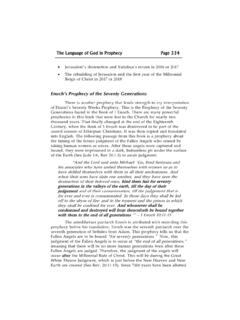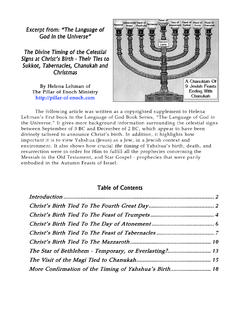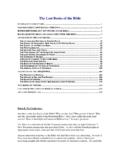Transcription of Which Ancient Texts Are the Most Reliable? - Pillar of Enoch
1 48 The Language of God in History the spiritual and historical past of the Sethites and Israelites, and Pagan myths and legends have their place in helping us to understand what occurred before recorded history, the four aforementioned non-biblical religious manuscripts have a stronger claim to veracity than any Pagan myth, and should be required reading in every theological school. Which Ancient Texts Are the most reliable ? After seriously studying them for a number of years, I have come to the conclusion that the writings of Josephus, the book of 1 Enoch , the book of jasher , and - to a more limited extent - the book of Jubilees and 2 Enoch are authentic Semitic histories that preserve an accurate record of the spiritual beliefs that arose prior to and after the Great Flood. Therefore, they can be relied upon to fill in the huge voids left in the abbreviated Genesis account of antediluvian history.
2 Due to internal evidence and their harmonization with the Bible, it appears that the book of Jubilees, jasher , and 1 Enoch are either authentic histories, or compilations containing genuine historical information in a framework of later narrative. That is why these books are the basis for most of the suppositions in this book about what may have occurred prior to the Great Flood. However, unlike the book of jasher and Jubilees, the book of 1 Enoch is also filled with divinely inspired prophecies. So, though it too is useful as a history, the book of 1 Enoch is also a storehouse of extremely Ancient , God-breathed prophetic knowledge. This makes 1 Enoch the oldest divinely sanctioned prophetic work available to mankind outside of the Gospel in the Stars. When one ventures into religious literature for research purposes, it can be quite daunting to discover just how much extra-biblical literature is available in institutions of higher learning, or through specialty or Internet book stores.
3 There is a wide range of material available to study, including many Ancient Texts that are considered to be Apocryphal or Pseudepigraphical in nature. That is, these Texts are not considered to be canonical and are therefore unwisely looked down upon as completely unreliable, legendary, or fictitious in nature. There are also the writings of Judaic scholarship to consider, including their copious amounts of written commentary on Scripture called the Midrash. In addition, there are compilations of material from the Apocrypha and Pseudepigrapha that are further commented on and explained in works such as Flavius Josephus Antiquities of the Jews, and Louis Ginzberg s The Legends of the Jews. Though I always trust Chapter Two: The Legacy of Enoch , Pre-Flood Prophet of God 49 what the Bible says about origins and history over the Talmud, Midrash, Apocrypha, Pseudepigrapha, history, or compilation, these other sources are often helpful for filling in the blanks in areas that the Bible mentions but doesn t explain, and therefore invites questions about - such as the Giants, the Nephilim, and the Watchers that we will discuss at length in this book .
4 In this chapter, it will be shown that 1 Enoch is very valuable as a prophetic source - one that is comparable to some biblical prophetic books. Therefore, in addition to analyzing biblical and extra-biblical Judeo-Christian religious teachings about human history in this book , we will decipher what Enoch s prophecies were meant to show this final generation before Christ s Second Coming in book Four. Since the book of 1 Enoch contains the best source of information about the Nephilim, it is quoted from extensively in this book . Many people, however, are not familiar with this Ancient manuscript and may therefore wonder how reliable it is as an historical account of the past. This section will address these concerns regarding three Ancient Judeo-Christian manuscripts Which have given me the best source of information about our biblical past outside of Josephus: the book of 1 Enoch , the book of Jubilees, and the book of jasher .
5 In the process, it will show that these books should be considered much more reliable than the many Pagan myths that non-Christian scholars often rely on to determine what happened in the far past. Though some scholars believe that 1 Enoch or the Ethiopian book of Enoch is a Jewish work conceived of no later than the third or fourth century before Christ, other scholars feel it may be much older. Originally, it was likely written in Hebrew, and many fragments of the book were found written in Hebrew among the Dead Sea Scrolls. It was also highly regarded among all the early Christian Church Fathers, but mysteriously vanished from Western liturgical usage after the establishment of the Roman Catholic Church. In book Four, we will discuss Enoch s prophecies and the possibility that sinister efforts were made to suppress these prophecies. This may explain this manuscript s near total disappearance in the Dark Ages except in the commentaries and letters of the early Church Fathers.
6 In 1773, in Abyssinia - Which is an archaic name for modern day Ethiopia - the English explorer James Bruce found the full manuscript of the book of 1 Enoch to still be extant in the religious literature of the Ethiopian Christians, along with the book of Jubilees. He brought back three copies of 1 Enoch recorded in Ethiopic script, and these effectively re-introduced Western scholars to Enoch s incredible record of antediluvian times. Today, the book of 1 Enoch and the book of Jubilees 50 The Language of God in History still hold a high place among the sacred books of the Ethiopian Christian Church. There, they are considered canonical, and they are used as references when Ethiopian Christians study God s Word. Unfortunately, they are still relatively unknown to many Christians in the West, who are often unaware of their spiritual and historical value.
7 Despite being regularly overlooked, the book of 1 Enoch and the book of Jubilees are considered to be authentic God-inspired scriptural documents by some Western scholars. Though most see Jubilees and 1 Enoch as compilations written by different people sometime during the post-exilic period of Jewish history, many scholars feel that 1 Enoch was written, at least in part, by Enoch and also possibly by Noah. If Enoch composed all or most of 1 Enoch , it would have been written sometime between Enoch s birth in 3381 BC and his translation in 3016 BC. If so, the historical information in 1 Enoch was recorded long before the Great Flood of 2347 BC. In order to show how important the book of 1 Enoch is as a Judeo-Christian reference work, it is important to establish who Enoch was, and - more importantly, why we should care about what he wrote in his manuscript. To find out, let s first look in the book of Genesis.
8 There, we are told that Enoch was the son of Jared, and the seventh patriarch in the line of Seth. We are also told that Enoch walked with God and never saw death: Enoch walked with God; then he was no more, because God took him away. - Gen. 5:24 (NIV) By saying that Enoch walked with God, the author of this section of Genesis was stating that Enoch had a very close personal relationship with Yahweh and, like Abraham, was considered righteous by his faith. Now, Enoch may have first been taught that the metaphorical Language of God was symbolically written into the Cosmos at the time of Creation by his great, great, great grandfather Cainan, who died at the age of 910, and lived for two hundred more years after the time that Enoch was translated. As good students often do, Enoch sought to know more than his wise old ancestor Cainan, and drew so close to Yahweh and His holy angels that he understood the Language of God in the starry heavens better than anyone else of his era.
9 Enoch called this celestial record the Heavenly Tablets, and said it contained the deeds of men and angels throughout time. As was shown in book One, the celestial storybook we call the Zodiac also foretold the coming of the one future King, Priest, and Redeemer who would come to conquer the fallen angel Azazel ( Satan), sin, and death forever. Chapter Two: The Legacy of Enoch , Pre-Flood Prophet of God 51 Uncannily, Enoch s book often speaks of this coming Redeemer and King and His future reign of righteousness. For this reason, many skeptics have claimed that, after the time of Christ, Christians wrote over half of the book of 1 Enoch found in Ethiopia, and that it was never part of the original book . However, there is no conclusive proof that this ever occurred. Furthermore, several of Enoch s most profound and earth-shaking prophecies about the future are found in the latter section of the book supposedly added long after Enoch was translated.
10 Therefore, it would be safe to assume that only a great prophet of God like Enoch could have written these amazing prophecies. Since Enoch had such great faith in Yahweh, he was chosen to reveal a great deal more of God s hidden testimony about Himself than Cainan. So, though the Language of God in the stars was probably initially revealed to Cainan, Enoch was likely the first man to discern its full implications. Though the book of 1 Enoch was likely translated into Ethiopic from an Aramaic or Hebrew original, Enoch probably originally used some form of hieroglyphic writing to record this book . In addition, Enoch may have written other books Which are now badly corrupted, such as the book of the Secrets of Enoch , or 2 Enoch . There is also some reason to believe that Enoch - or one of his descendents or followers - carved the Dendera ceiling Zodiac and drew up the architectural plans for the Great Pyramid complex at Giza.












